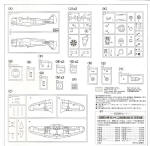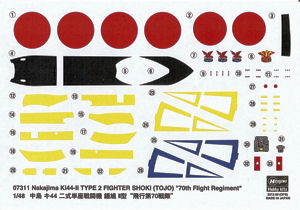
Hasegawa 1/48 Ki-44 '70th Fighter Regiment
| KIT #: | 07311 |
| PRICE: | 2,240 yen SRP |
| DECALS: | Two options |
| REVIEWER: | Andrew Garcia |
| NOTES: | Flat coated kit decals |

| HISTORY |
See
Scott Van Aken’s review and build of the Hasegawa 1/48th scale
Ki-44 in the Kit # 9137 boxing for a very nice overview of the Shoki. For
this in-the-box review I would add the unique aspect of the Ki-44 in this
boxing is it features late war combatants providing parts for two different
versions of the aircraft.
| THE KIT |
 First
released in February of 1996 (as Kit Jt36 or #09136) the kit is similar to
the many Japanese WWII kits released by Hasegawa in the mid-1990’s.
Excellent surface detail, good tight fit, clear and easy assembly with
decals for the instrument panels that gives you a great cockpit
out-of-the-box(OOB) build.
First
released in February of 1996 (as Kit Jt36 or #09136) the kit is similar to
the many Japanese WWII kits released by Hasegawa in the mid-1990’s.
Excellent surface detail, good tight fit, clear and easy assembly with
decals for the instrument panels that gives you a great cockpit
out-of-the-box(OOB) build.
This
kit is the latest incarnation and has two good features. The clear parts
contain both trees “R” and “S” which are the front canopy section with the
telescopic sight (Ki44-I) and reflector gunsight (Ki44-II). Previous
releases for the most part had only clear parts “R or “S”. Thus, you can
build all versions except the prototype with the plastic in this kit.
Recently, in late 2012, it appeared Hasegawa re-released most of the
original versions of their 1/48th kits in a limited release plan.
Thus, you can find the original Ki44-I, Kit 09136, Jt36, re-released in 2012
and available for ¥1,920 Yen (approx. $24.48)
plus shipping from
Although Hasegawa is the master of kit re-boxing and for most releases it is
just a new set of decals and no new plastic, I have come to appreciate their
superb package which includes nice decals, instructions, etc. with the
required research to enable me to correctly portray some unique aircraft.
This release contains the normal highly detailed hard plastic Hasegawa trees
from previous releases. The very big change is the decal is thinly printed
and has a flat coat!! For those aficionados of Hasegawa kits the thick gloss
coated decals were inappropriate and always identified as a shortcoming.
They are listening and these decals are
 worth
using OOB. Just remember to use very hot water, a 6 second dip, and use
Future as your setting agent. You won’t be able to move the decal around
though with this approach so be careful with the initial placement.
worth
using OOB. Just remember to use very hot water, a 6 second dip, and use
Future as your setting agent. You won’t be able to move the decal around
though with this approach so be careful with the initial placement.
This
release, Kit # 07311, features two aircraft. The first option is Ki-44-II
Hei 70th Flight Regiment flown by Major Atsuyuki Sakado in June
1945 featuring markings for three B-29 victories. This is the later “II”
version with the reflector gunsight. The second marking option is Ki-44-I
(KOH) also from the 70th Flight Regiment flown by Sgt. Sadao
Miyazawa with the telescopic gunsight in February 1945 featuring markings
for one F6F Hellcat victory.
This
is another very nice release for the Ki-44 Shoki modeling interest crowd!
| CONCLUSIONS |
This
is not a big deal release but for anyone who likes Japanese aircraft like
the Ki-44 it is a much appreciated release since it is a fine kit and an
easy build. The HLJ prices used
in this review appear very reasonable so get one soon before they disappear
or the price goes up due to the changing exchange rates. I would expect to
see this kit selling on eBay at an inflated price for the unknowing shopper
in the near future.
| REFERENCES |
Modeling Madness Kit Reference section. From this section you will find
Hasegawa Ki-44 release information such as:
Ki 44 I : 09182 will
build the rare Ki 44 I only, also includes instructions and decals to modify
the kit to build pre-production Shokis that saw combat in
Ki 44 II a : 09137,
09603 and 09825 build a Ki4 4 IIa (Ko = a) only.
Ki 44 II b : 09177 and
09301 build the Ki 44 IIb (
Ki 44 II c : Both 09136,
09336, and 09531 build a Ki
44 IIc (Hei = c) only. 51020 is the Ki 44 IIc kit with a set of Jaguar resin
super detail parts.
Ki 44 II a and II c :
Both 09194, 09711, 09958, and 07311 include the parts to build either the
IIa or IIc version.
October 2012
If you would like your product reviewed fairly and fairly quickly, please contact the editor or see other details in the Note to Contributors.